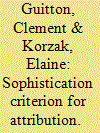| Srl | Item |
| 1 |
ID:
139768


|
|
|
|
|
| Summary/Abstract |
Human rights have become a central aspect of global peace-building strategies, and are often pursued through instruments of transitional justice. In this paper I focus on the role of truth and reconciliation commissions (TRCs) for human rights in post-conflict settings and argue that the global politics of reconciliation, which is supposed to unveil the ‘truth’ about, and help to overcome, past human rights violations, serves as a vehicle that brings the human rights language to post-conflict settings. While this might be expected to be empowering for the local people, the Sierra Leonean case suggests that, here, the particular human rights narrative promoted by the TRC had two potentially depoliticising effects: first, by narrating the past conflict as a series of human rights violations while downplaying the political motives and claims that kept it going; second, by constituting the local people as the victims and perpetrators of past human rights violations who are above all in need of reconciliation and healing. The TRC’s human rights narrative thereby overwrote other subject positions held by the people, such as those of soldier, rebel, or civilian. It also neutralised the political claims held by these subjects and replaced them with the therapeutic need for reconciliation and healing.
|
|
|
|
|
|
|
|
|
|
|
|
|
|
|
|
| 2 |
ID:
122268


|
|
|
|
|
| Publication |
2013.
|
| Summary/Abstract |
In the wake of Stuxnet, there has been an increasing tendency on the part of politicians and analysts to see the sophistication of a cyber-attack as an indication of its perpetrator. Indeed, the more sophisticated the attack, the more sophisticated the attacker, thereby pointing to a state actor as the culprit - or so it is argued. However, Clement Guitton and Elaine Korzak note the lack of clarity and inconsistency around the term 'sophistication', contending that it is context-dependent and therefore that it cannot be used unquestioningly in identifying the perpetrator of a cyber-attack.
|
|
|
|
|
|
|
|
|
|
|
|
|
|
|
|